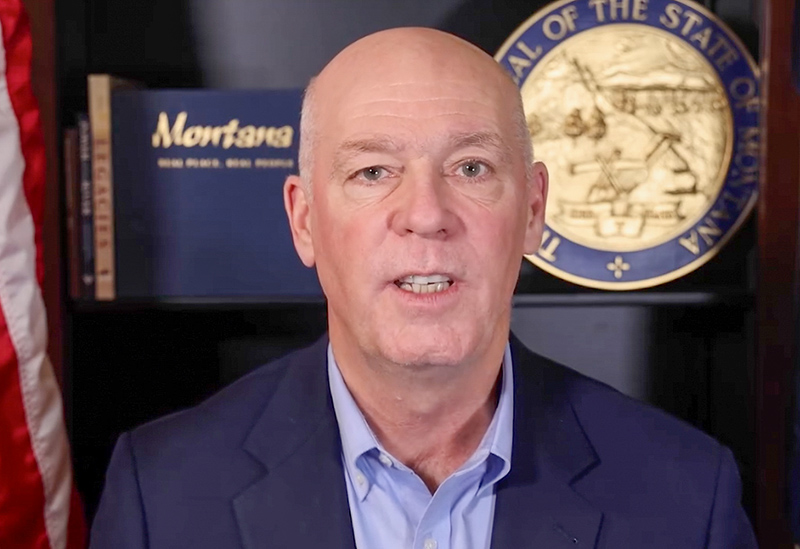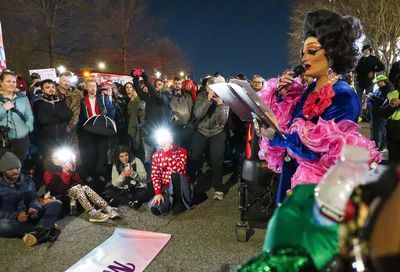Judge Refuses to Block Law Restricting Adult Transgender Care
Patients argue that a Florida law requiring "informed consent' forms and imposing other restrictions hinders their access to medically necessary care.
By John Riley on September 9, 2023 @JRileyMW

A federal judge refused to block a Florida law that imposes restrictions and hurdles on transgender adults before they can access hormone therapy or surgical interventions.
U.S. District Judge Robert Hinkle, of the Northern District of Florida, denied a request for an injunction to stop Florida authorities from imposing those restrictions, finding that the four adult plaintiffs did not prove that the additional regulations governing the provision of gender-affirming care have significantly harmed them or impacted their ability to receive care.
“[T]he challenged statute and rules do not prohibit adults from obtaining treatments of the kind the plaintiffs seek. Two plaintiffs will be unable to obtain hormone treatment from their current providers. But despite the plaintiffs’ contrary assertions, they may be able to obtain the treatment from others,” he wrote.
“Two other plaintiffs say their scheduled surgeries were canceled and that the surgeons said the challenged statute was the reason. But even if the plaintiffs’ testimony about this is not inadmissible hearsay — an unlikely proposition — the surgeons’ statements, without a further explanation, do not tie their decision to anything a preliminary injunction would cure. The record does not show that a preliminary injunction would affect the surgeons’ willingness to perform the surgeries at this time.”
Under the law, transgender adults seeking out gender-affirming care must consent, in writing, to receiving the treatments.
That process involves completing forms adopted by the state Board of Medicine and the Board of Osteopathic Medicine warning of the effects of such treatments. They must also submit written acknowledgment that they were both given those forms beforehand and informed of the risks of pursuing gender-affirming care, in person, by their doctor.
Critics of the forms adopted by the respective medical boards have argued that they are unscientific pieces of propaganda that portray all gender-affirming treatments as dangerous and experimental, in a not-so-veiled effort by state authorities to discourage transgender adults from pursuing medical transition.
The restrictions also require doctors treating transgender adults to meet with them in person to administer treatments, eliminating any telehealth options for things like prescription renewal, and require that prescriptions for gender-affirming treatments like hormones only be issued by licensed physicians, not nurse practitioners.
Separate in-person visits must occur if a physician issues any scripts for pharmaceutical products not previously prescribed to the patient.
The law restricting transgender adult patients also blocks doctors from prescribing gender-affirming treatments for minors.
Parents of transgender children filed a lawsuit challenging the law, arguing that it infringes on their parental rights. In June, Hinkle issued an injunction blocking the law until a court rules on its validity, finding that the plaintiffs were likely to succeed in proving the law is unconstitutional. The state is appealing that ruling.
The lawsuit was subsequently revised to add several transgender adults as plaintiffs, arguing that the bill has erected “unnecessary barriers” to care and imposed “medically unsupported requirements” on transgender individuals.
It also argues that the law, and the resulting rules adopted by the state Board of Medicine and the Board of Osteopathic Medicine have created a “crisis of availability of care” for trans adults.
Hinkle had also previously struck down a Florida Agency for Health Care Administration rule prohibiting Medicaid dollars from being used to cover the cost of gender-affirming medical treatments that assist in a gender transition.
In a two-hour hearing on Sept. 1, Hinkle heard arguments over whether he should block the portions of the law imposing restrictions on transgender adult health care from being enforced.
Jennifer Levi, the senior director of transgender and queer rights for GLBTQ Legal Advocates and Defenders, which is representing the plaintiffs, argued that the informed consent forms have led doctors to cancel surgeries and stop offering hormone therapy for some patients.
Levi also argued that the consent forms’ language is misleading and contains incorrect information portraying gender-affirming treatments as “based on very limited, poor-quality research with only subtle improvements seen in some patients’ psychological functioning in some, but not all, research studies.”
Hinkle criticized the language of the informed consent forms, calling them “abysmally drafted.”
Mohammad Jazil, an attorney representing the state, conceded that the forms were “perhaps inartfully drafted” but defended the language, saying they were emergency rules.
But Hinkle, while not yet ruling on the merits of the law, appeared to be favoring the plaintiffs’ arguments arguing that the restrictions on adult patients be overturned.
“If somebody is really trying to communicate with patients, this is not how they do it. And I’ll just tell you … one of the questions I’ll have for you at the trial is, why shouldn’t I infer from that form that the goal was not to inform and get honest consent, the goal was to discourage people? … Why are you doing this?” he asked Jazil.
“It seems to me those forms cut against the state pretty strongly,” Hinkle added.
Ultimately, however, Hinkle declined to block the law from being enforced, finding that the adult plaintiffs would not suffer “irreparable harm” if he declined to issue an injunction prior to the start of a trial scheduled to begin on Nov. 13.
In addition to rejecting the request for an injunction, Hinkle declined to rule on whether to certify the lawsuit as a class-action lawsuit, which would allow additional plaintiffs to challenge the law if they believe it hindered their access to medically necessary care. He also refused to block individual provisions prohibiting telehealth visits or requiring that only physicians be allowed to prescribe hormone treatments.
Hinkle did say he could issue a narrowly tailored injunction to allow individual plaintiffs to continue receiving care if they provided detailed medical records to the court, according to Orlando Weekly.
Lawyers for the plaintiffs, including representatives from GLBTQ Legal Advocates & Defenders (GLAD), the National Center for Lesbian Rights (NCLR), Southern Legal Counsel, and the Human Rights Campaign Foundation, expressed disappointment in Hinkle’s decision.
“The state’s restrictions on well-established health care in SB 254 serve no purpose other than to intentionally prevent transgender people from receiving the care they need,” the lawyers said in a statement. “This case is far from over and we will continue to take every legal step to challenge this law that takes away Floridian’s ability to make important decisions about their own lives and hands it over to the government instead.
“Florida’s SB 254 is part of a broader landscape of laws that are hurting transgender people in Florida and across the country,” the statement continued. “…All of us who believe in fairness, science, and freedom must also keep fighting on every level to ensure people in Florida and across the country can live their lives free from draconian and unlawful attacks on their health and wellbeing.”
Editor’s note: This story was subsequently updated to include information about the rejection of a preliminary injunction.
Utah Bans the Pride Flag
Local governments, schools, and other public buildings will be fined $500 per day if they fly or display the Pride flag.
By John Riley on March 31, 2025 @JRileyMW
Utah is the first state to ban the LGBTQ Pride flag from schools and all government buildings.
Republican lawmakers pushed for the bill, declaring that it was needed to encourage "political neutrality" from teachers and other government employees.
But State Rep. Trevor Lee (R-Layton), the House sponsor, specifically singled out Pride flags as a representation of a political "ideology" rather than a symbol of identity.
Under the law, which takes effect on May 7, entities allowing the Pride flag -- or any banners representing political ideologies or affiliations, including MAGA flags -- will be fined $500 daily.
Sarah McBride Urges Dems to Embrace Dialogue on Trans Rights
Transgender congresswoman's comments highlight how Democrats are navigating how to respond to anti-trans political attacks.
By John Riley on March 24, 2025 @JRileyMW
U.S. Rep. Sarah McBride (D-Del.), the first openly transgender person ever elected to Congress, has reportedly cautioned Democrats about the need to foster conversations when it comes to engaging with those who have reservations about certain issues like transgender participation in sports.
"We have to create more space in our tent," McBride told NOTUS about how Democrats should approach people with reservations or genuine questions about transgender inclusion. "If, for instance, we want to have a majoritarian coalition -- not just electorally, but specifically on issues around trans rights -- that, by necessity, is going to have to include people who have a range of thoughts.
Montana Governor Signs Anti-Trans Bills into Law
Montana Gov. Greg Gianforte has signed two bills banning transgender people from bathrooms matching their gender and from women's sports.
By John Riley on March 30, 2025 @JRileyMW
Montana Gov. Greg Gianforte signed two anti-transgender bills into law, one of which bars transgender people from public restrooms matching their gender identity and the other banning transgender women and girls from female-designated sports teams.
The laws were passed on party-line votes in both legislative chambers, with Republicans voting in the affirmative.
The first law requires public schools, correctional facilities, other public buildings -- including the state Capitol -- and domestic violence shelters to designate bathrooms, changing facilities, and sleeping areas for a single sex -- male or female. Entry to such spaces will be based on a person's assigned sex at birth, as determined by a person's chromosomal makeup.
Support Metro Weekly’s Journalism
These are challenging times for news organizations. And yet it’s crucial we stay active and provide vital resources and information to both our local readers and the world. So won’t you please take a moment and consider supporting Metro Weekly with a membership? For as little as $5 a month, you can help ensure Metro Weekly magazine and MetroWeekly.com remain free, viable resources as we provide the best, most diverse, culturally-resonant LGBTQ coverage in both the D.C. region and around the world. Memberships come with exclusive perks and discounts, your own personal digital delivery of each week’s magazine (and an archive), access to our Member's Lounge when it launches this fall, and exclusive members-only items like Metro Weekly Membership Mugs and Tote Bags! Check out all our membership levels here and please join us today!
The Magazine
-
Most Popular
 'Porn Star University' Started by Gay-for-Pay Creator Andy Lee
'Porn Star University' Started by Gay-for-Pay Creator Andy Lee  The Commanding Style of Nathan Lee Graham
The Commanding Style of Nathan Lee Graham  Anheuser-Busch Abruptly Ends Sponsorship of St. Louis PrideFest
Anheuser-Busch Abruptly Ends Sponsorship of St. Louis PrideFest  Utah Bans the Pride Flag
Utah Bans the Pride Flag  Film: Spring Arts Preview 2025
Film: Spring Arts Preview 2025  Stage: Spring Arts Preview 2025
Stage: Spring Arts Preview 2025  Montana Governor Signs Anti-Trans Bills into Law
Montana Governor Signs Anti-Trans Bills into Law  Win Tickets to Awesome Con!
Win Tickets to Awesome Con!  Trump Targets Law Firm for Defending Transgender Rights
Trump Targets Law Firm for Defending Transgender Rights  Riki Wilchins: 'Not Passing is Now a Criminal Offense'
Riki Wilchins: 'Not Passing is Now a Criminal Offense'
 Utah Bans the Pride Flag
Utah Bans the Pride Flag  3 Million People Could Die Due to HIV Funding Cuts
3 Million People Could Die Due to HIV Funding Cuts  Celebrities Urged to Boycott Hungary Over Pride Ban
Celebrities Urged to Boycott Hungary Over Pride Ban  The Commanding Style of Nathan Lee Graham
The Commanding Style of Nathan Lee Graham  Texas 'Sexual Content' Bill Would Criminalize Literary Works
Texas 'Sexual Content' Bill Would Criminalize Literary Works  Awesome Con Celebrates the Geek in All of Us
Awesome Con Celebrates the Geek in All of Us  Win Tickets to Awesome Con!
Win Tickets to Awesome Con!  Film: Spring Arts Preview 2025
Film: Spring Arts Preview 2025  Classical & Choral Music: Spring Arts Preview 2025
Classical & Choral Music: Spring Arts Preview 2025  Broadway: Spring Arts Preview 2025
Broadway: Spring Arts Preview 2025
Scene
Metro Weekly
Washington's LGBTQ Magazine
P.O. Box 11559
Washington, DC 20008 (202) 638-6830
About Us pageFollow Us:
· Facebook
· Twitter
· Flipboard
· YouTube
· Instagram
· RSS News | RSS SceneArchives
Copyright ©2024 Jansi LLC.












You must be logged in to post a comment.